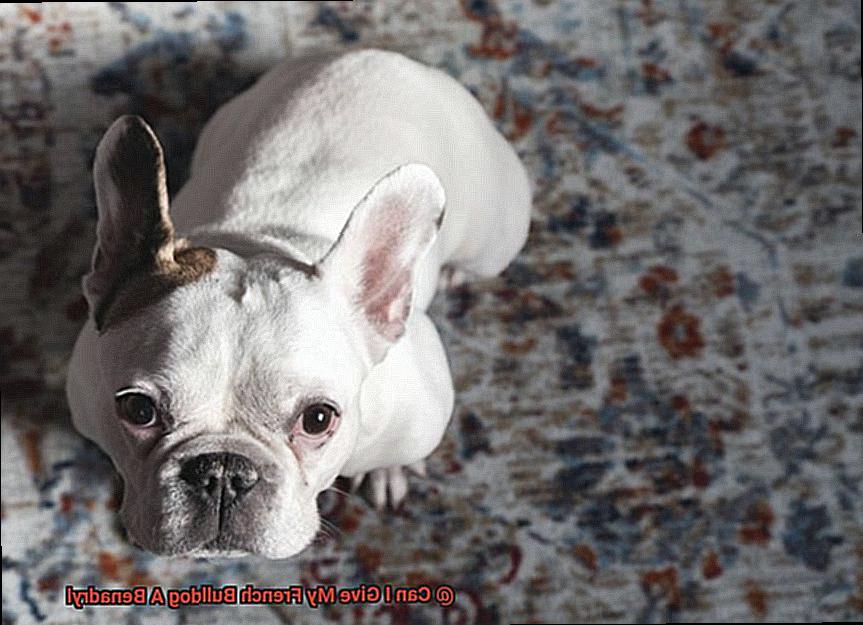Can I Give My French Bulldog A Benadryl?
We all know how distressing it can be to see our furry pals dealing with pesky allergies or irritating itchiness. It’s only natural to want to help them find some relief. And when it comes to household meds, one that often crosses our minds is good ol’ Benadryl – that trusty antihistamine. But hold your doggy treats for a sec. Before you go reaching for the medicine cabinet, let’s dig into the risks and rewards of giving your French Bulldog Benadryl.
Benadryl, also known as diphenhydramine (fancy name alert.), is a go-to remedy for allergies, hives, itching, and other human-related annoyances. And guess what? It can work wonders for certain pup problems too – but only under proper veterinary supervision. You see, our Frenchies have their own unique physiology and health conditions that need special attention.
In this ultimate guide, we’ll dive deep into the potential risks and rewards of using Benadryl to tackle those allergic woes or irritating itches in your French Bulldog. Armed with this knowledge, you’ll be able to make an informed decision about your furry friend’s well-being. So buckle up and join us on this exciting journey through the world of Benadryl and the fascinating realm of French Bulldog care.
Should I Give My French Bulldog Benadryl?
Contents
- 1 Should I Give My French Bulldog Benadryl?
- 2 How to Administer Benadryl to Your French Bulldog Safely
- 3 Dosage Guidelines for Giving a French Bulldog Benadryl
- 4 Potential Side Effects of Benadryl in French Bulldogs
- 5 Alternatives to Consider Before Giving Your French Bulldog Benadryl
- 6 When is it Appropriate to Give Your French Bulldog Benadryl?
- 7 Essential Tips for Administering Benadryl to a French Bulldog
- 8 Key Takeaways: Can I Give My French Bulldog a Benadryl?
- 9 Conclusion
French Bulldogs are adorable and affectionate companions, but just like any other breed, they can experience allergies and other health issues. As a responsible pet owner, you may be wondering if it’s safe to give your French Bulldog Benadryl to alleviate their symptoms.
In this article, we will explore the importance of consulting with a veterinarian before administering Benadryl to your furry friend.
Consulting with a Veterinarian:
Before giving any medication to your French Bulldog, it is crucial to consult with a veterinarian. They have the knowledge and expertise to assess your dog’s specific health condition and determine if Benadryl is appropriate for them. It’s always better to be safe than sorry when it comes to your pet’s well-being.
Safe Dosage and Administration:
While Benadryl is generally safe for dogs, it is important to follow the correct dosage and administration guidelines. Giving your French Bulldog too much Benadryl can lead to adverse effects and may be harmful to their health. The dosage of Benadryl for dogs is typically based on their weight, so make sure to accurately weigh your furry friend and calculate the appropriate dosage accordingly.
Common Uses of Benadryl in Dogs:
Benadryl can be used to treat various conditions in dogs, including allergic reactions, itching, insect bites, motion sickness, and anxiety. However, it’s important to note that Benadryl may not always be the most effective or appropriate treatment for these conditions. Your veterinarian will determine the best course of action based on your French Bulldog’s unique needs.
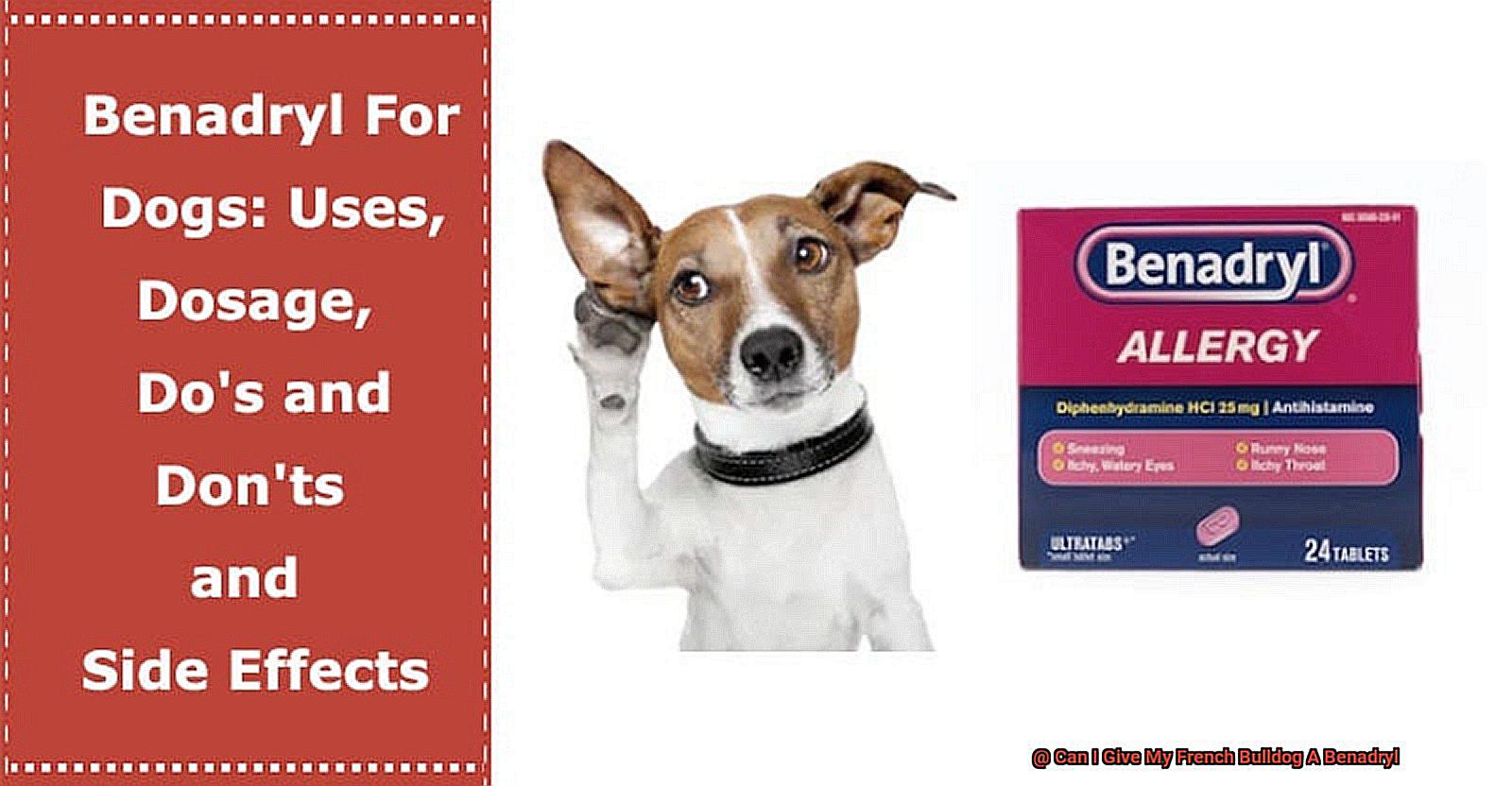
Potential Side Effects:
Like any medication, Benadryl can have side effects in dogs. These may include drowsiness, dry mouth, urinary retention, and gastrointestinal upset. If you notice any concerning symptoms after giving your French Bulldog Benadryl, it is crucial to contact your veterinarian immediately.
Considerations and Alternatives:
Certain conditions and medications may interact with Benadryl, so it is essential to inform your veterinarian about any other medical issues or medications your French Bulldog may be taking. It’s also worth mentioning that Benadryl should not be used as a substitute for proper veterinary care. If your French Bulldog has persistent or severe allergy symptoms, it is best to consult with a veterinarian for a comprehensive evaluation and treatment plan.
How to Administer Benadryl to Your French Bulldog Safely
Sometimes, allergies, itching, or mild anxiety can affect your pup’s well-being. In such cases, Benadryl can be a useful tool to alleviate their discomfort. However, it’s crucial to administer this medication safely and under the guidance of a veterinarian.
Consult with Your Veterinarian:
Before giving any medication to your French Bulldog, including Benadryl, always consult with your veterinarian. They will determine the appropriate dosage based on your dog’s weight and health condition. Your vet knows best.
Choose the Right Form:
Benadryl is available in tablets, capsules, and liquid forms. If your French Bulldog dislikes swallowing pills, opt for the liquid version. It may be easier to administer by mixing it with their food.
Administering Benadryl:
There are several ways to give Benadryl to your French Bulldog. You can hide it in their favorite treat or use a pill dispenser designed for dogs. If needed, you can crush the tablet and mix it with a small amount of wet food.
Avoid Certain Ingredients:
Make sure the Benadryl you give your French Bulldog does not contain alcohol or additional medications without veterinary guidance. These substances can be harmful to your pup.
Monitor for Side Effects:
After administering Benadryl to your French Bulldog, keep a close eye on them for any adverse reactions. Common side effects may include drowsiness, dry mouth, or urinary retention. If you notice anything unusual or severe side effects, contact your vet immediately.
Dosage Guidelines for Giving a French Bulldog Benadryl
Is your French Bulldog feeling a bit under the weather? Maybe they’re dealing with pesky allergies, irritating itching, or even mild anxiety. Well, fear not. Benadryl can be their knight in shining armor, helping them find relief and get back to their playful selves.
But before you unleash the Benadryl, there are a few dosage guidelines you should keep in mind to ensure your pup’s safety and well-being.
- Consult a Veterinarian: First things first, always consult with a veterinarian before giving any medication to your furry friend. They know your dog’s health history and can provide specific dosage recommendations tailored to their needs.
- Weight Considerations: Just like humans, the dosage of Benadryl for French Bulldogs is typically based on their weight. It’s important to know your dog’s weight accurately before administering the medication. As a general guideline, you can give 1 mg of Benadryl per pound of body weight. So, if your French Bulldog weighs 20 pounds, you would administer 20 mg of Benadryl.
- Start with a Low Dosage: It’s always best to start with a lower dosage and gradually increase if necessary. This allows you to monitor your dog’s response and ensure they don’t experience any adverse side effects. Remember, every pup is unique.
- Use Children’s or Liquid Formulation: When it comes to administering Benadryl to French Bulldogs, the liquid form or children’s formulation can be easier to handle. You can mix it with their food or give it directly using a syringe – it’s up to you and your pup’s preferences.
- Avoid Certain Ingredients: When choosing a Benadryl product for your French Bulldog, make sure it doesn’t contain any additional active ingredients like decongestants or pain relievers. These ingredients can be harmful to dogs and may cause unwanted reactions.
- Frequency of Administration: The frequency of administering Benadryl to your French Bulldog will depend on their specific needs. Your veterinarian will be able to determine whether it should be given once or twice a day or only as needed for specific allergic reactions or symptoms.
- Monitor for Side Effects: While Benadryl is generally safe for dogs, it can still cause side effects. Some common ones include drowsiness, dry mouth, and urinary retention. Keep a close eye on your furry friend and contact your veterinarian immediately if you notice any unusual or severe side effects.
- Consider Your Dog’s Health Conditions: If your French Bulldog has any pre-existing health conditions, such as liver or kidney problems, it’s crucial to discuss this with your veterinarian. They will provide specific dosage recommendations and closely monitor your dog’s response to the medication.
Potential Side Effects of Benadryl in French Bulldogs
When it comes to keeping our furry friends healthy and comfortable, medications like Benadryl can be a game-changer. However, it’s important to be aware of the potential side effects that may occur when giving Benadryl to your French Bulldog. Here are some things you should know:

Drowsiness or Sedation:
The most common side effect of Benadryl in French Bulldogs is drowsiness or sedation. This is because Benadryl has a mild sedative effect on the central nervous system. Your Frenchie may appear sleepy or lethargic after taking the medication. It’s best to give Benadryl when your pup can rest and relax, especially if they need it for allergies or to help them sleep during a long car ride.
Gastrointestinal Upset:
Some French Bulldogs may experience gastrointestinal upset as a side effect of Benadryl. This can manifest as vomiting, diarrhea, or loss of appetite. If these symptoms persist or worsen, it’s important to consult a veterinarian. They can help determine if the medication is causing the issue or if there may be another underlying problem.
Allergic Reaction:
In rare cases, French Bulldogs may have an allergic reaction to Benadryl itself. Signs of an allergic reaction can include facial swelling, difficulty breathing, hives, or itching. If any of these symptoms occur, immediate veterinary attention is necessary. It’s crucial to have your Frenchie evaluated by a professional who can provide appropriate treatment.
Pre-existing Conditions and Medications:
Certain pre-existing medical conditions or medications being taken by your French Bulldog may increase the risk of experiencing side effects from Benadryl. It’s essential to consult with a veterinarian before administering any medication to ensure it is safe and appropriate for your individual dog.
Dosage:
It’s important to note that the dosage of Benadryl for dogs is different than that for humans. Giving your Frenchie too much Benadryl can lead to an overdose and potentially serious side effects. Always follow the veterinarian’s recommended dosage instructions to ensure your dog’s safety.
Long-Term Use:
Using Benadryl as a long-term solution for chronic conditions may have additional side effects. Prolonged use can lead to tolerance and reduced effectiveness over time. Additionally, relying solely on Benadryl may mask the underlying problem and delay proper diagnosis and treatment. It’s important to work closely with your veterinarian to determine the best course of action for your French Bulldog’s health.
Alternatives to Consider Before Giving Your French Bulldog Benadryl
Before resorting to medication like Benadryl, it’s worth exploring alternative solutions to address your pup’s allergies. In this article, we’ll discuss natural alternatives that can help alleviate your French Bulldog’s symptoms and improve their overall quality of life.
Adjust their environment:
French Bulldogs are prone to allergies and irritants. By identifying and eliminating potential triggers in their surroundings, you can significantly reduce their symptoms. Consider the following:
- Use hypoallergenic bedding to minimize exposure to dust mites.
- Avoid harsh cleaning products that may irritate their sensitive skin.
- Limit their exposure to pollen by keeping them indoors during peak allergy seasons.
Modify their diet:
Food allergies can be a common cause of discomfort in French Bulldogs. Switching to a high-quality, hypoallergenic dog food that is free from common allergens like wheat, soy, and corn may help alleviate their symptoms. Consult with your veterinarian for specific dietary recommendations.
Regular grooming:
Frequent brushing and bathing can help remove allergens from your French Bulldog’s coat and skin. Additionally, keeping their ears clean and dry can prevent ear infections, which are common among this breed.
Natural remedies:
Certain herbs and supplements have anti-inflammatory properties that may provide relief for allergies in dogs. Consider incorporating chamomile, nettle, or omega-3 fatty acids into your dog’s diet after consulting with your veterinarian.
Behavior modification techniques:
For certain conditions that cause discomfort or anxiety in French Bulldogs, behavior modification techniques can be beneficial. Training your dog to wear a cone or using positive reinforcement methods to redirect excessive scratching can help reduce the need for medication.
Seek professional advice:
Consulting with a veterinarian who specializes in dermatology or allergies is crucial when exploring alternatives. They can provide tailored recommendations based on your French Bulldog’s specific needs and medical history.
When is it Appropriate to Give Your French Bulldog Benadryl?
French Bulldogs are adorable and lovable companions, but just like humans, they can also suffer from allergies, anxiety, and motion sickness. In such cases, you may be wondering if it is appropriate to give your furry friend Benadryl. Well, the answer is: it depends. Let’s dive into when it’s appropriate to use this medication for your French Bulldog.
- Allergies: French Bulldogs can experience allergies that cause uncomfortable symptoms like itching, sneezing, and watery eyes. If your vet determines that your pup is suffering from allergies, Benadryl can help provide relief. It works by blocking histamines, which are responsible for allergic reactions. However, always consult with your vet before administering any medication.
- Anxiety and Motion Sickness: Some French Bulldogs may get anxious during car rides or other stressful situations. If your pup starts panting excessively or gets nauseous during travel, Benadryl can help manage their anxiety or motion sickness. Its calming effect can make the journey more enjoyable for both of you.
- Dosage and Formulation: Remember, the dosage of Benadryl for dogs is different from that for humans. Your vet will determine the correct dosage based on your French Bulldog’s weight and condition. Additionally, make sure to choose a plain antihistamine formulation without any added ingredients that might be harmful to your pup.
- Side Effects and Monitoring: Just like any medication, Benadryl can have side effects in dogs. These may include drowsiness, dry mouth, and urinary retention. It’s crucial to monitor your French Bulldog closely after administering the medication and contact your vet if you notice any concerning symptoms.
- Not a Substitute for Veterinary Care: While Benadryl can provide temporary relief for certain conditions, it should never replace proper veterinary care. If your French Bulldog is experiencing severe allergic reactions or other medical issues, it’s essential to seek professional veterinary assistance.
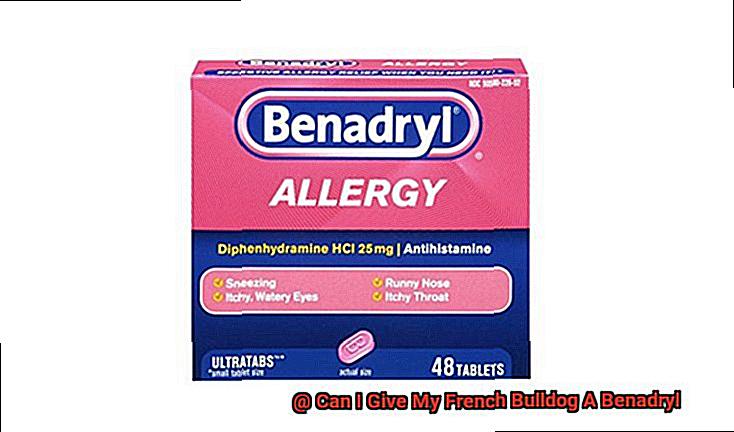
Remember, every dog is unique, and what works for one may not work for another. Always consult with your veterinarian before giving your French Bulldog any medication, including Benadryl. They will guide you on the appropriate dosage, potential side effects, and the best course of action for your pup’s specific needs.
Essential Tips for Administering Benadryl to a French Bulldog
When it comes to administering Benadryl, an over-the-counter medication commonly used for allergies, it is crucial to follow a few essential tips. In this article, we will explore the importance of consulting with a veterinarian, understanding the correct dosage, different forms of Benadryl available, and tips for effective administration. Let’s dive in.
Consult with a Veterinarian:
Before giving any medication to your French Bulldog, it is essential to consult with a veterinarian. French Bulldogs have unique health considerations, and a professional can determine if Benadryl is appropriate for your dog’s specific needs. They will provide personalized advice based on their knowledge of your dog’s medical history and any existing conditions.
Reasons for Administering Benadryl:
French Bulldogs may require Benadryl for various reasons, including allergies, motion sickness during car rides, or anxiety-related issues. Benadryl can help alleviate symptoms such as itching, sneezing, and hives by blocking the action of histamine in the body.
Ensure Correct Dosage:
The correct dosage of Benadryl for your French Bulldog depends on their weight and age. While general guidelines exist, only a veterinarian can determine the appropriate dosage for your dog. It is crucial to avoid self-medicating and follow professional guidance to prevent potential complications.
Different Forms of Benadryl:
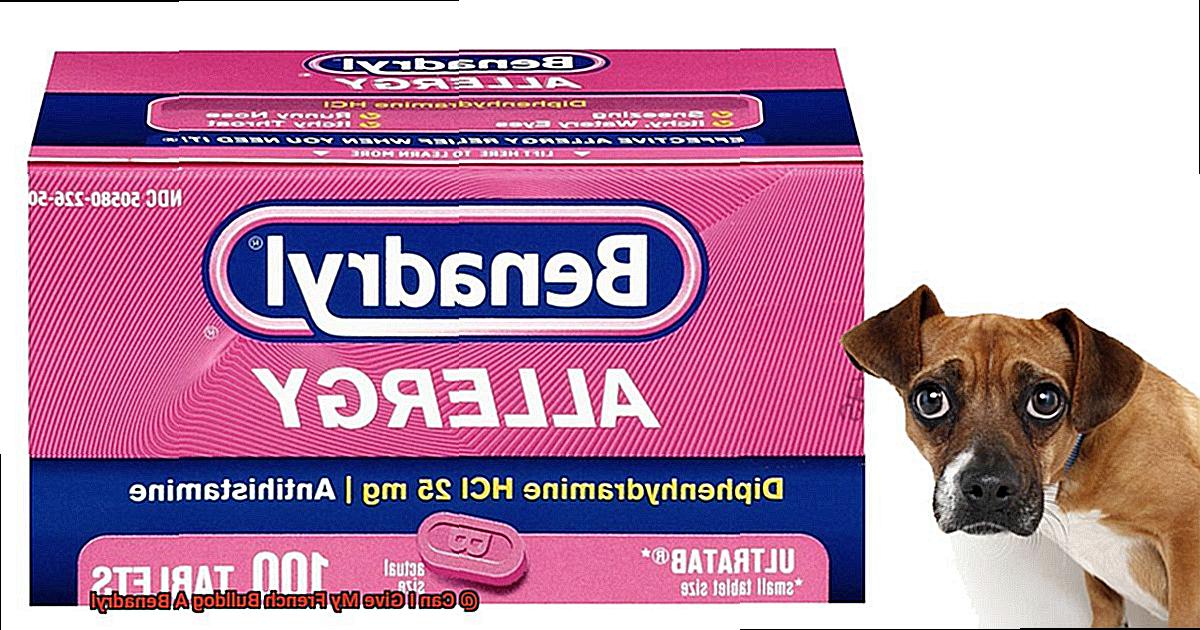
Benadryl is available in various forms such as tablets, capsules, and liquid. Each form has its advantages and disadvantages. Tablets or capsules may be easier to administer but can be difficult if your dog is resistant to taking pills. Liquid forms can be mixed with food or water but may have a slightly bitter taste. Consulting with your veterinarian will help determine the most suitable form for your French Bulldog.
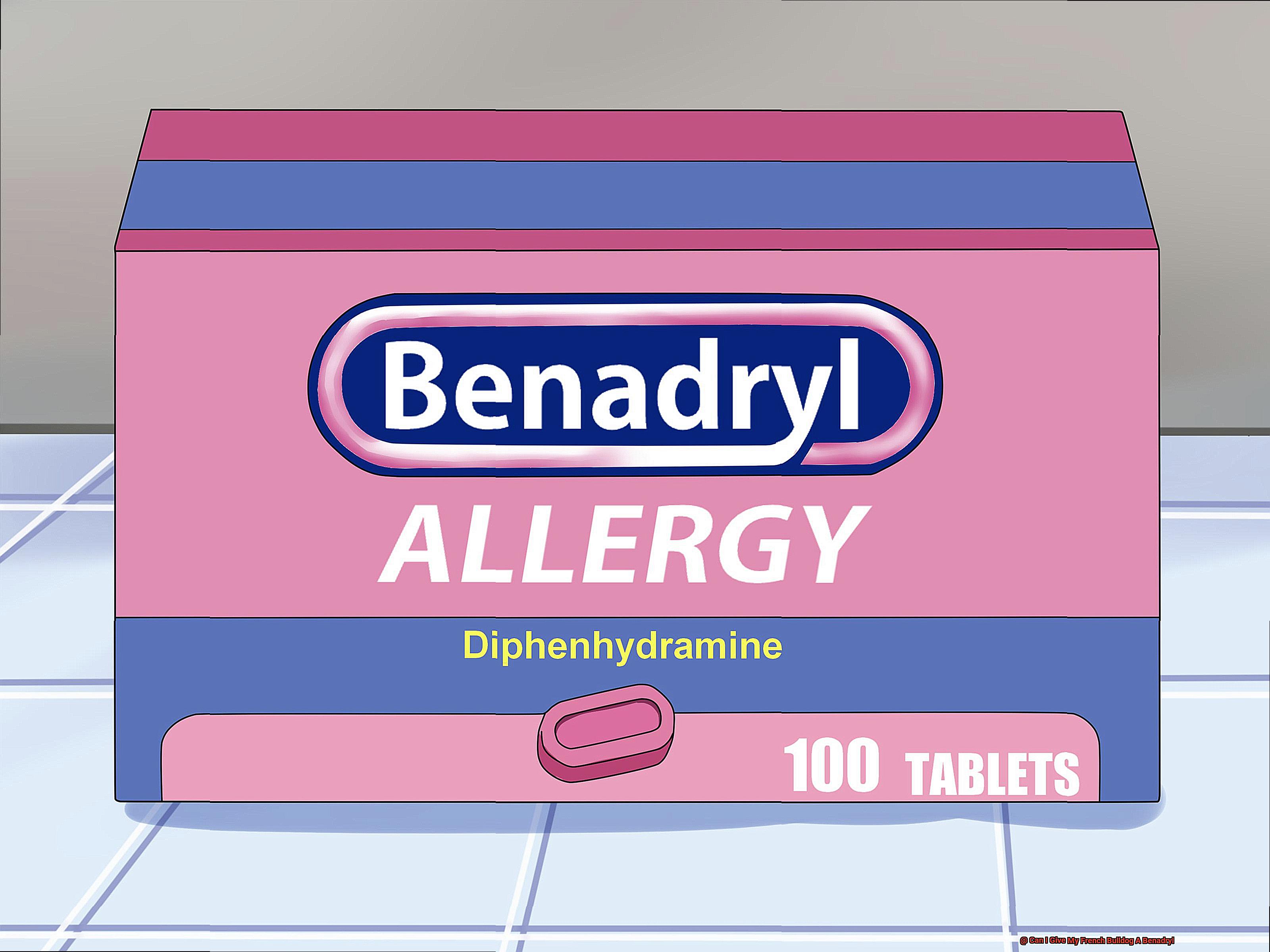
Administering Benadryl:
Administering medication to dogs can be challenging, especially when they are not fond of taking pills. To make it easier, you can hide the medication in a treat or use a pet pill dispenser. Ensure that your French Bulldog swallows the medication and does not spit it out to ensure its effectiveness.
Watch for Side Effects:
While generally safe, Benadryl can cause side effects in dogs, including drowsiness, dry mouth, or urinary retention. These side effects are typically mild but should be monitored closely. If you notice any concerning symptoms, contact your veterinarian immediately for further guidance.
Key Takeaways: Can I Give My French Bulldog a Benadryl?
While Benadryl can be a helpful tool in certain situations, it’s important to consult with a veterinarian before administering any medication to your furry friend. Here’s why:
- Every dog is unique: Just like humans, dogs can have individual sensitivities and health conditions that may make certain medications unsafe for them. Consulting with a veterinarian ensures that your French Bulldog’s specific needs and health history are taken into consideration.
- Dosage matters: The dosage of Benadryl for dogs is typically based on their weight. Giving your French Bulldog too much Benadryl can lead to adverse side effects such as drowsiness, dry mouth, urinary retention, vomiting, diarrhea, and even seizures. Your veterinarian will provide the correct dosage and guidelines to ensure your pup’s safety.
- Underlying health conditions: Certain medical conditions, such as glaucoma, cardiovascular disease, and thyroid problems, can make it unsafe for a French Bulldog to take Benadryl. Your veterinarian will evaluate your dog’s health and determine if Benadryl is the appropriate treatment option.
- Not a long-term solution: While Benadryl can provide temporary relief for allergies or other symptoms, it should not be used as a long-term solution. It’s best to address the underlying cause of the issue and work with your veterinarian to develop a comprehensive treatment plan.
- Veterinary expertise matters: Your veterinarian is the best resource when it comes to your French Bulldog’s health. They have the knowledge and experience to evaluate your dog’s specific needs and provide appropriate guidance. If you suspect that your French Bulldog is experiencing an allergic reaction or any other health issue, seeking veterinary care is crucial.

eDG3HPRxhGY” >
Conclusion
In conclusion, it is important to consult with your veterinarian before giving your French Bulldog Benadryl. While it may seem like a quick fix for allergies or anxiety, the health and well-being of your furry friend should always come first. Your vet will be able to assess your dog’s specific needs and determine if Benadryl is the right solution. Remember, what works for one dog may not work for another, so it’s crucial to seek professional advice.
Furthermore, self-medicating can be dangerous and potentially harmful to your French Bulldog. The dosage and potential side effects of Benadryl can vary depending on the size, weight, and overall health of your dog. Only a qualified veterinarian has the knowledge and expertise to provide accurate guidance in this matter.
Additionally, there are alternative options available that may address your dog’s allergies or anxiety without resorting to medication. Your vet may recommend lifestyle changes, dietary adjustments, or natural remedies that can alleviate symptoms in a safer and more holistic manner.
Ultimately, ensuring the well-being of your French Bulldog requires responsible pet ownership. This means seeking professional advice, being cautious about administering medications without proper guidance, and exploring all available options before making any decisions that could impact your dog’s health.
Remember, when it comes to the health of our beloved pets, it’s always better to be safe than sorry.
